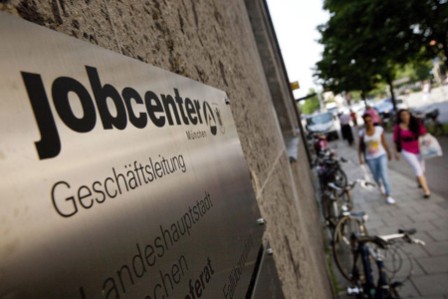German unemployment hits 24-year low
German unemployment fell in April to the lowest level in 24 years as the recovery in Europe’s biggest economy continues to pick up speed, data showed on Thursday.
The number of people registered as unemployed in Germany fell by a seasonally-adjusted 8,000 to 2.792 million, the lowest level since late 1991, the Federal Labour Office said.
That was slightly fewer than expected, as analysts had been pencilling in a decline of around 10,000.
The unemployment rate — which measures the jobless total against the working population as a whole — stood at 6.4 percent in April, unchanged from March and the lowest level since west and east Germany reunited in 1990 after the fall of the Berlin Wall the previous year.
In raw or unadjusted terms, the jobless total decreased by 88,660 to 2.843 million and the jobless rate fell to 6.5 percent in April from 6.8 percent in March, the labour office said.
Normally, unemployment declines in the spring as the warmer weather allows companies in sectors such as construction to take on workers.
But the current strength of the economic recovery in Germany was magnifying that effect, the labour office said.
“Early indicators point to a continuation of the positive development in 2015,” it said.
“The labour market is developing positively, both on the supply and demand side.”
- Positive trend to continue -
Leading economic think tanks and the government have recently upgraded their growth forecasts for the current year as falling oil prices, low inflation and rising wages boosts consumers’ purchasing power, the main driving force behind the current recovery.
“The news on the job market is positive,” said BayernLB economist Stefan Kipar.
“And looking at the current high level of sentiment indices, and the favourable economic fundamentals, the positive development on the labour market looks set to continue in the coming months,” he said.
The weak euro is good for exporters and low oil prices and interest rates are helping to keep a lid on companies’ costs and therefore boosting earnings, the expert said.
Berenberg Bank economist Christian Schulz said Germany’s labour market “will continue to benefit from strong output growth as the economy recovers from the euro crisis and in turn ensures solid gains in consumption.”
“The German labour market remains as solid as a rock,” said ING DiBa economist Carsten Brzeski.
He dismissed an unexpected drop in retail sales in March, reported earlier by the federal statistics office, insisting that retail sales are “the most volatile monthly data the German economy can offer.”
“The extremely solid labour market remains the showcase model of the German recovery,” Brzeski said.
Related Posts

